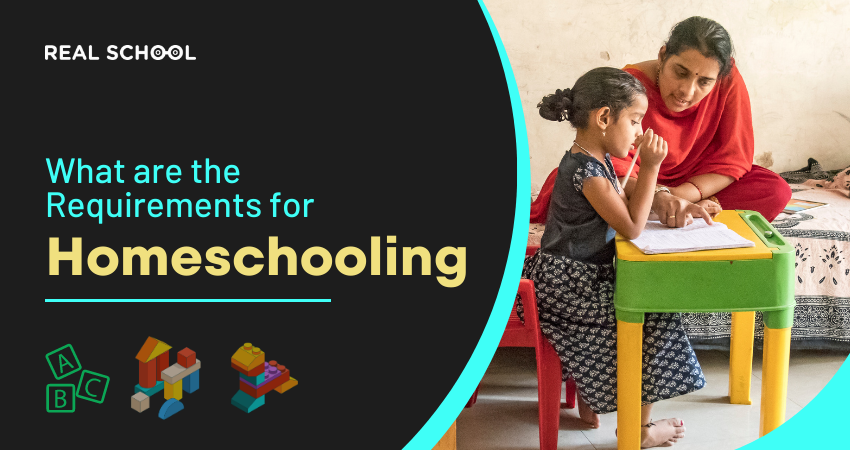What Are The Requirements For Homeschooling?


Families have the ability to customize their child’s educational experience through homeschooling, a dynamic and popular educational option. Although this method allows for customization and flexibility, it also has certain standards that differ depending on the locality and educational authorities. Understanding the rules is essential whether you’re a parent thinking about homeschooling for the first time or trying to assure compliance with the law.
The laws governing homeschooling differ by nation and, in certain situations, by state or region within a nation. The following are typical needs in general:
Legal Compliance For Homeschooling:
The first step in homeschooling is to ensure you are aware of and adhere to the legal requirements in your specific state or country. Homeschooling laws vary widely, and some regions have strict regulations, while others have more relaxed guidelines. It’s essential to research your local laws and understand what is expected of homeschooling families. Common legal requirements may include filing a notice of intent to homeschool, annual evaluations, and compliance with curriculum standards.
Educational Plan For Homeschooling:
Many regions require homeschooling parents to create an educational plan or outline detailing the subjects, materials, and learning objectives that will be covered during the school year. Some areas may even require approval of this plan by educational authorities. This plan serves as a roadmap for your child’s education and ensures that it aligns with state or national standards.
Record-Keeping For Homeschooling:
Keeping meticulous records is a fundamental aspect of homeschooling. You may need to maintain records of attendance, coursework, grades, and progress reports. These records not only demonstrate compliance with educational requirements but also help you track your child’s academic development.
Teacher Qualifications For Homeschooling:
While many places do not require homeschooling parents to have formal teaching qualifications, some areas may specify minimum educational requirements or teaching certification. Familiarize yourself with the teacher qualification standards in your region.
Standardized Testing For Homeschooling:
In some states or countries, homeschooled students are required to participate in standardized testing to assess their academic progress. These tests may be administered annually or at specific grade levels. Be aware of any testing requirements in your area.
Assessments during Homeschooling:
Educational authorities may conduct periodic assessments or evaluations of homeschooled children to ensure they are receiving a quality education. These assessments can take various forms, including portfolio reviews, interviews, or standardized tests.
Also Read: What Is The Best Online Homeschooling Program?
Notification on Homeschooling:
In some regions, homeschooling families must notify their local school district or education department of their intent to homeschool. Ensure that you follow the proper notification procedures, including any required forms or documentation.
Curriculum Choice For Homeschooling:
Selecting an appropriate curriculum is a crucial aspect of homeschooling. It’s essential to choose a curriculum that aligns with your child’s grade level and educational goals. Some areas may have specific curriculum requirements, so be sure to research and comply with these standards.
Socialization in Homeschooling:
Addressing socialization is an important aspect of homeschooling. Parents often seek out opportunities for their homeschooled children to interact with peers. This can be accomplished through involvement in local homeschooling support groups, sports teams, community clubs, and extracurricular activities.
Annual Reporting For Homeschooling:
Some regions may require homeschooling families to submit annual reports detailing their child’s progress, including academic achievements and assessments. These reports may be reviewed by educational authorities to ensure that the child is receiving a proper education.
Also Read: How Much Does Homeschooling Cost In India ?
Conclusion
Remember that homeschooling requirements can change over time and vary from place to place, so it’s crucial to stay informed and updated on the specific regulations in your area. Consulting with local homeschooling associations, education authorities, or legal professionals who specialize in homeschooling can provide valuable guidance to help you meet these requirements effectively. Know more – The Real School
Frequently asked questions (FAQs)
1. Is homeschooling legal in India or state?
Ans: Yes, homeschooling is legal in India. However, legality varies by location. Research your state’s laws and regulations regarding homeschooling to ensure compliance.
2. Do I need to be a certified teacher to homeschool my child?
Ans: In many places, you do not need teaching certification to homeschool your child. However, some areas may have specific requirements regarding parental qualifications.
3. What curriculum should I use for homeschooling?
Ans: The choice of curriculum depends on your child’s needs and your preferences. You can select pre-packaged curricula, online programs, or create a customized curriculum.
4. How do homeschooled children socialize with peers?
Ans: Homeschooled children can socialize through activities such as local homeschooling groups, sports teams, community events, and extracurricular activities.
5. Are homeschooled students eligible for college admissions?
Ans: Yes, most colleges and universities accept homeschooled students. However, admission requirements may vary, and homeschooled applicants may need to provide additional documentation or take standardized tests. It’s advisable to check with individual institutions for their specific requirements.
Recent Posts
What are the Advantages of Online Teaching at The Real School?
In the article -"What are the Advantages of Online Teaching at The Real School?" we…
What is the Full Form of School?: Unveiling the Acronym
The term "school" carries profound significance in the realm of education, representing more than just…
What is Math Full Form?: Cracking the Code
Mathematics, often referred to as "Math," is a subject that elicits various reactions from students…
What is Full Form of Homework?: Decoding Academics
Homework, an integral part of the academic journey, often raises questions about its purpose and…
What is Full Form of Teacher?: Demystifying Education
In the intricate tapestry of education, teachers stand as the pillars shaping the intellectual and…
What is Real Education?: Discovering Its Essence and Impact
The concept of real education is evolving, transcending traditional views that equate it solely with…



